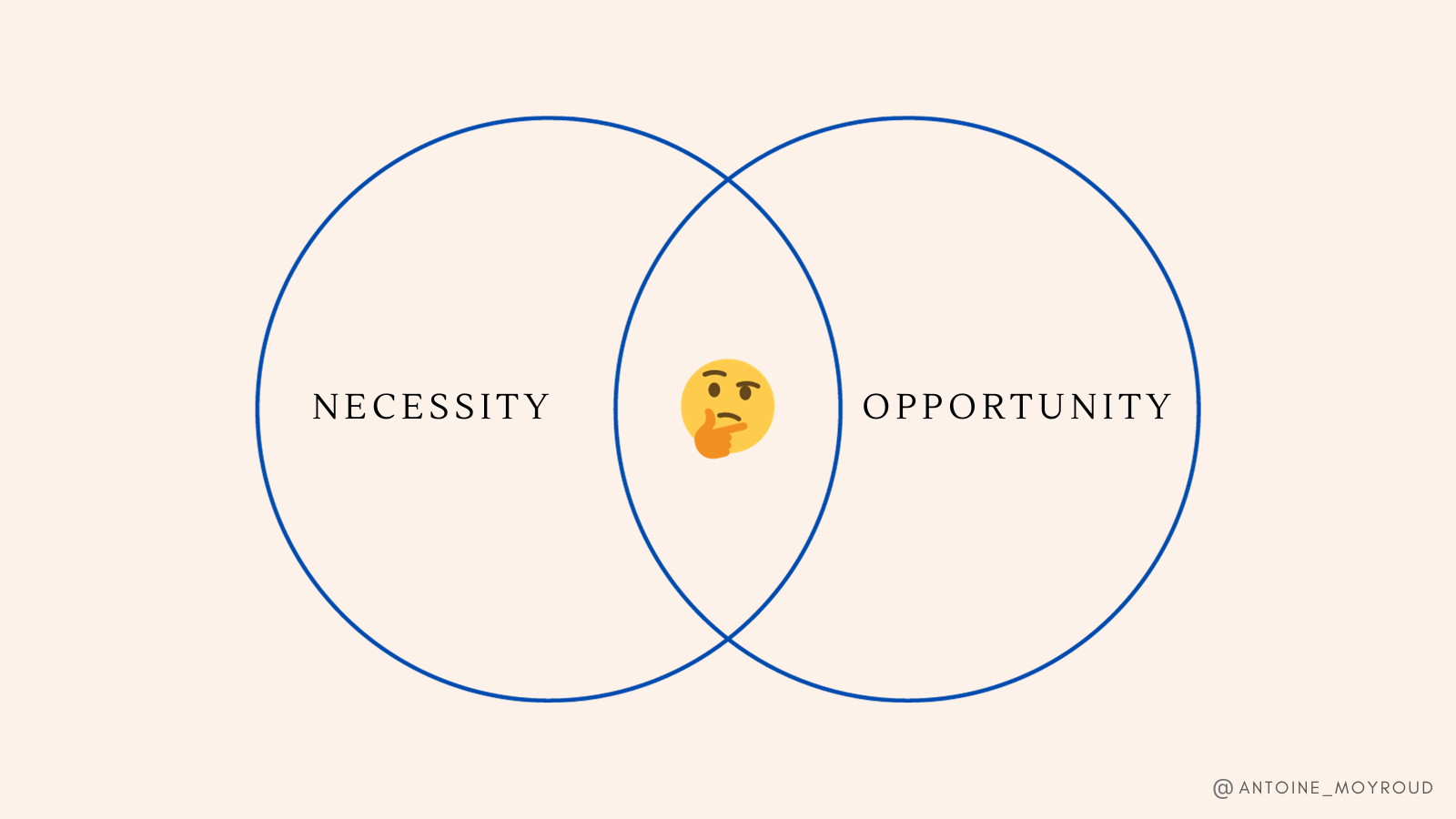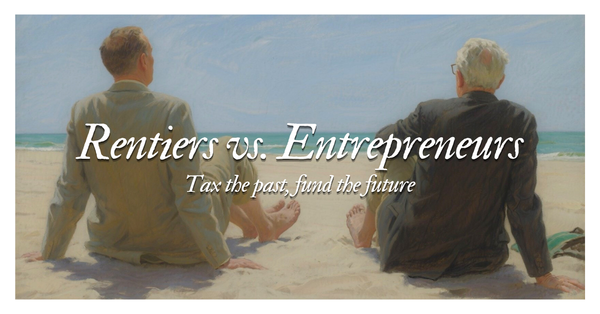Are You the Right Kind of Founder? Navigating Social Spending's Impact on Entrepreneurial DNA
Exploring how social support shapes founders: from opportunity-seizing to necessity-driven mindsets. It's time to rethink success by blending these traits. What kind of founder are you?

This is the second part to my blog post on Social Spending and Entrepreneurship. You can find the first part here where I discussed the relationship between entrepreneurs and social spending in France.
This second post is a broader discussion on the paper "The effect of social spending on entrepreneurship in developed nations". The paper goes into detail about how they believe social spending affects entrepreneurship. Their work consisted in investigating those two parameters in isolation and without concern for the adjacent societal benefits derived from social spending. Interestingly, I've been in conversations with people who held similar arguments in the broader societal context so I'm sharing thoughts from that lens too.
Necessity x Opportunity = Best founders?
The paper addresses the topic of "necessity entrepreneurship" which I hadn't come across previously. Two definitions have been suggested to split founders across "necessity" and "opportunity":
- The question "Are you involved in this startup to take advantage of a business opportunity or because you have no better choices for work?"
- Defining 'necessity entrepreneurs' as entrepreneurs founding a business following unemployment versus 'opportunity entrepreneurs' leaving their jobs after recognising an opportunity to start a business.
Let's take the first question above:
The "no better choices" is an interesting point because most successful founders have a mix of both I believe. After having spotted a problem through past experiences (=taking advantage of a business opportunity), they can't picture working on something else until they've solved the problem (=no better choices). Now you might argue that comparing the importance of 'providing for your family' with 'being fixated on a business idea' just doesn't make sense. And I agree with you on that. But hear me out: I think there's something special about founders who have that sense of "necessity" in their DNA. It gives them an extra edge when it comes to overcoming obstacles, unlike those who are driven solely by opportunities. You could bucket "copy-cat founders" in this latter category who, when discovering a business opporunity, ruthlessly execute to build competing businesses. Rocket Internet has been famous for successfully executing this playbook and I believe some startup purists judge them heavily for this.
Founder traits
You've most likely heard over the COVID period and subsequent crises some derivative of "In the midst of crisis, lies great opportunity", "The best companies are built in times of crisis", "X-listed company was founded in a recession". Those sentences all play into the narrative that tough times bring out the best of resilient entrepreneurs. My sense is that this trope is used to characterise some derivative of "necessity entrepreneurship" where founders, in the midst of adversity, find the drive and hustle to power through and build successful businesses.
Many venture capitalists emphasize the importance of backing founders who have a "chip on their shoulder" or are immigrants or children of immigrants. They believe that such founders possess a strong drive to prove themselves and create a successful future for their families, which motivates them to walk through walls in order to make their ventures succeed.
Perhaps a healthy hybrid of the two is the key to entrepreneurial success?

Entrepreneurial Waves: Decoding Cyclical Trends 🌊
An additional interesting dimension is the cyclical nature of entrepreneurship and whether necessity and opportunity follow different patterns.
Long story short, the authors view entrepreneurship similarly to the scende from the El Dorado movie below: social spending should be removed so that the fear of failure becomes a much stronger motivator to start a venture.

Interestingly, the authors do discuss this tension, I would've loved to see some of their work investigate this topic further rather than dismiss it to push their hypothesis further:
One of the footnotes in the paper led me to a study from Robert Fairlie and Frank Fossen which I've found quite interesting. Their paper, published in 2017, shows the cyclical nature of necessity entrepreneurs who are "pushed" towards entrepreneurship out of necessity for lack of alternative opportunities. The graph below is quite telling, you can see how the necessity entrepreneurs (on the right) closely follow the curve of the unemployment rate.

In light of the above, the conclusions of the "effect of social spending on entrepreneurship" paper seem untenable:
Offering a social security mattress in the form of unemployment benefits seems like a healthy balance to level the playing field between individuals who already have the capital required to take risks and those who do not.
Pitching profits against risk aversion

Let's now dive into the broader points brought up by this paper. The study, focused on the Austrian approach, articulates 4 ideas:
- Regulatory change generates rent-seeking behaviours (tax-evasion, litigation, subsidiy-seeking)
- Tax schemes hamper the profit incentives of entrepreneurs while increasing the appeal of government sector jobs
- Social spending can discourage necessity-based entrepreneurship if individuals believe they are better off collecting state funds instead of pursuing self-employment.
- National social spending increases government employment opportunities, making entrepreneurship less attractive
Let's pick them apart:
- Regulatory change generates rent-seeking behaviours (tax-evasion, litigation, subsidiy-seeking)
I agree with this statement in the sense that during periods of transition, opportunity is created which drives both good and bad actors towards the honeypot. Subsidy-seeking isn't negative since they are an instrument for governments to drive attitudes. I've never heard anyone criticise the buyer of an EV for leveraging the grants and incentives. Don't hate the player, hate the game.
- Tax schemes hamper the profit incentives of entrepreneurs while increasing the appeal of government sector jobs
If your business model has so little margin that the taxation required to make the country offer social support makes it fall apart, I see that as a business-model failure rather than a policy failure...
- Social spending can discourage necessity-based entrepreneurship if individuals believe they are better off collecting state funds instead of pursuing self-employment.
We'll dig further into necessity entrepreneurship below but in my view this is a positive? Since unemployment benefits are a temporary measure to help people find new jobs, get additional training or start businesses, I don't really see the need for necessity-based entrepreneurship. If anything, one could argue that unemployment benefits boost opportunity entrepreneurship since founders have more room for error.
- National social spending increases government employment opportunities, making entrepreneurship less attractive compared to salaried public sector jobs due to workload, stress, and work-life balance considerations.
I've yet to come across an entrepreneur who was looking to make a call between those two...
Entrepreneurial education is..."meh"
The study also found that basic and advanced entrepreneurship education did not have a positive impact on developing entrepreneurship.
Unsurprisingly for anyone who has worked in a startup, theory only gets you so far and there's no better way to develop your entrepreneurial muscles than to head straight for the cold plunge. No amount of business modelling, Porter 5 Forces or whatever else, will prepare you for the hard day-to-day reality of taking a business off the ground.
This concludes this exploration of the link between social spending and entrepreneurship. While we're on the topic of social spending and policy, I've got a draft post on the topic of diversity x maths x entrepreneurship which I'm planning on getting out in short time so if that's something you're interested in too then don't hesitate to subscribe and be notified when it comes out.
As always, I've tried to source and redirect to the different articles and reports but if you've spotted any inaccuracies do let me know! Thanks to Arnauld Bessagnet for having spurred those thoughts with his post.




